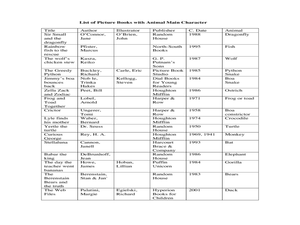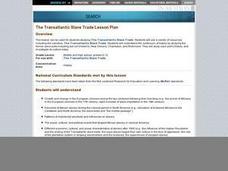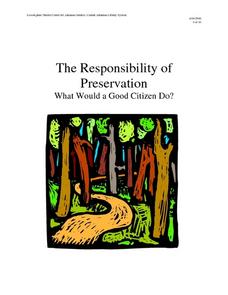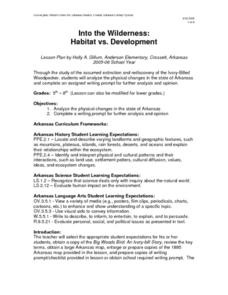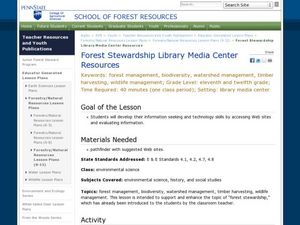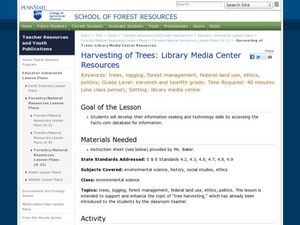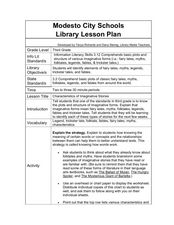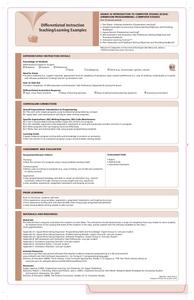Curated OER
Find an Animal! Find a Book!
Learners identify the themes of different books by classifying their genre. In this genre lesson, students examine a specific animal by reading both a nonfiction and fiction book about the species. Learners compare the different books...
Curated OER
The Transatlantic Slave Trade Lesson Plan
Students study former slave ports in the South.
Curated OER
Return South Migration Lesson Plan
Learners study the reasons so many immigrants returned to the South following the Civil Rights Movement. They examine how the former slaves influenced the cultural life in the Northern cities.
Curated OER
N is for Natural State
For any pupils who live in the state of Arkansas, this would be a fabulous educational experience to help them get to know their state better. Through the use of activities in literature, art, mathematics, science, social studies, and...
Curated OER
The Responsibility of Preservation
Upper elementary and middle schoolers study the case of the ivory-billed woodpecker, a bird that was once-thought to be extinct. Learners explore the responsibility of people to preserve habitats, and take care of the animals who live in...
Curated OER
Native Americans in Arkansas: The Quapaw
The Quapaw Indians of Arkansas are the focus of this American history lesson. Learners discover many aspects of the Quapaw culture, such as their dwellings, social organization, food, and how the tribe was eventually driven out of...
Curated OER
The Extinction and Rediscovery of the Ivory-Billed Woodpecker
An incredibly thorough, and well-designed lesson teaches youngsters about the presumed extinction and rediscovery of the ivory-billed woodpecker in Arkansas. Learners discuss the environmental factors that led to the birds disappearance....
Curated OER
Into the Wilderness: Habitat vs. Development
By studying the once-assumed extinction, then rediscovery of the Ivory-Billed Woodpecker, learners look at the physical changes that have occured in habitats throughout Arkansas. This outstanding lesson is chock full of terrific...
John F. Kennedy Presidential Library & Museum
Analyzing the Inaugural Address
Get high school historians to step outside their own shoes by responding to JFK's inaugural address from the perspective of a civil rights activist, a soviet diplomat, or a Cuban exile. After a class discussion about the address, the...
Thirteen Ed Online
What is Conceptual Art?
Research, art history, and web page creation! Sounds too good to be true. With tons of links and resources, the instructional activity provides you with everything needed to engage the class in an amazing art and research activity. They...
Curated OER
I Can Be Whomever I Wish
Famous people who have overcome obstacles are the focus of this language arts and social studies instructional activity. Pupils are introduced to the concept that they have the ability to overcome obstacles in life. They read selections...
Library of Congress
To Kill A Mockingbird: A Historical Perspective
Students study the novel, To Kill a Mockingbird. Through studying primary source materials from American Memory and other online resources, students of all backgrounds study the relationships between blacks and whites.
UNICEF
Get Real on Climate
Climate change isn't just about a warming planet; it will affect humans' health, spread of disease, changes in heat waves and droughts, and changes in storms and wildfires. Participants explore global climate change through discussions...
Facing History and Ourselves
Preparing Students for Difficult Converstaitons
Many of the issues facing 21st Century learners are challenging and even discussing these issues can be a challenge. So how do teachers prepare learners for these difficult conversations? How do instructors create a safe classroom where...
Curated OER
Forest Stewardship Library Media Center Resources
Students develop their technology skills by accessing web sites and evaluating information. In this research instructional activity students research forestry topics and write a paragraph on the accessed websites.
Curated OER
Religious Dissent
Learners perform a readers theater about Anne Hutchinson and her religious dissent. In this religious dissent lesson plan, students re-enact her trial through the reader's theater.
Curated OER
Harvesting of Trees: Library Media Center Resources
Students research harvesting of trees in the United States and write a summary. In this informative lesson students state whether they agree or disagree with an article and write a summary on why.
Curated OER
Organizers for Students
Students . In this organization instructional activity, students have a general discussion about sports cards and make a chart to answer the questions. Students read the baseball card story from USA Today. Students watch a web video...
Curated OER
Create A Map!
Students examine two- and three-dimensional shapes, and discuss map skills and attributes. They plan and create their own school campus maps using pre-cut building site shapes.
Curated OER
Famous People Lesson Plan
Students brainstorm a list of the achievements of people in their lives. In groups, they discuss the decisions that help people meet their goals later in life and identify values that help one overcome obstacles. They use the internet...
Curated OER
Class Book Awards
Young scholars study the criteria used to select notable book awards, including the Caldecott Medal and the Newbery Medal. Then they develop their own Class Book Awards to bestow upon favorite books in the classroom library. They decide...
Curated OER
Characteristics of Imaginative Stories
Third graders explore genre characteristics. In this genre literacy lesson, 3rd graders listen to a variety of fiction stories and classify them according to genre. Students identify common features in each genre and complete a chart by...
Ontario
Animation Programming—Computer Studies
Introduce high schoolers interested in animation programming to fundamental programming concepts so that they can plan and write simple programs.
Curated OER
Structure of Natural Narratives
Class pairs select a prompt from a provided list and tell (and record) their story to their partner. They then examine linguist William Labov's model for natural narratives, and apply his model to their tale. Next, class members watch...


